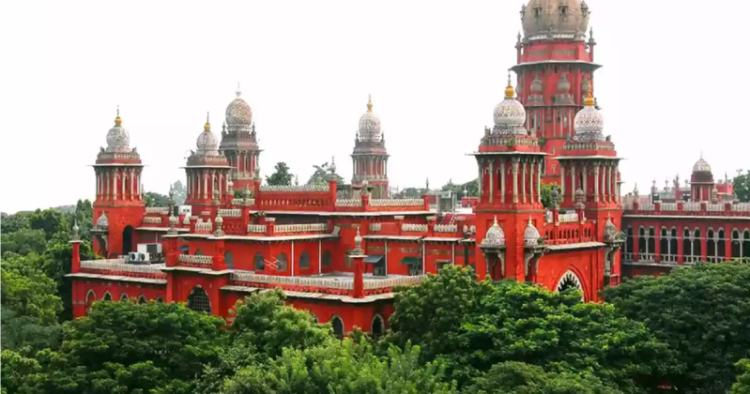In a decisive move aimed at protecting temple properties from encroachment, the Madras High Court has issued a stern warning to tenants squatting on temple lands, emphasising the need for strict enforcement of property laws and respect for religious sentiments.
A division bench comprising justices SM Subramaniam and K Rajasekar highlighted the gravity of the issue, stating that encroachments upon temple property by tenants pose a serious legal challenge that demands stringent action. The court emphasised the importance of temple authorities remaining vigilant in safeguarding their land holdings while urging tenants to adhere to the terms of their lease agreements.
The judiciary’s intervention, guided by established legal principles, was deemed crucial in resolving disputes and upholding the rule of law, the bench noted. The judges stressed that judicial intervention was necessary to safeguard the sanctity of temple lands and uphold the rights of all parties involved.
The remarks came in response to appeals filed by film producer RB Choudry, MD of Super Good Films Private Limited, seeking an order for the registration department to register land belonging to the Agastheeswara Prasanna Venkatesa Perumal temple at Nungambakkam.
The central issue of the case revolved around a piece of land controlled by the Hindu Religious and Charitable Endowments (HR and CE) Department, with the appellants claiming ownership following a sale deed executed in 1992. The temple, identified as the sole and absolute owner of vast expanses of land in and around Nungambakkam, had fixed a monthly rent of Rs 15/- for tenancy.
In a recent legal battle over property ownership, film producer RB Choudry approached the court seeking registration of a property measuring one ground and 277 square feet in his firm’s name. The property, acquired from Siddiqa, was previously claimed to have been purchased from the legal heirs of a leaseholder in 1992. However, authorities had refused to register the property, leading to the dispute.
The legal heirs of the leaseholder obtained title to the land through a civil court order, but Siddiqa’s petition in this regard was dismissed by the court, deeming the civil court order null and void. The original tenant, who was irregular in rent payments to the temple, passed away in 1986, leaving behind surviving legal heirs who defaulted on rent payments. Consequently, a suit for recovery of possession was filed in the City Civil Court.
Choudry and his firm pursued legal recourse by filing a writ petition, which was dismissed by the Writ Court. Challenging this decision, they opted for a writ appeal before the High Court.
After hearing arguments from both parties, the High Court delivered its verdict. While acknowledging allegations of fraudulent execution of the Sale Deed and alienation of temple property, the court refrained from delving into those aspects. However, it deemed the petition under the Tamil Nadu City Tenants Protection Act as non-maintainable. Consequently, the execution of the Sale Deed and alienation of temple property, based on orders under Section 9 of the Act, were deemed untenable and null and void in the eyes of the law.
The bench emphasised Section 111 of the Hindu Religious and Charitable Endowments Act, which prohibits questioning notifications, orders, or decisions made under the Act in any court of law. Therefore, the court ruled that the entire sale transaction concerning the alienation of temple property between private parties was null, void, and unenforceable.
Furthermore, the court invalidated orders passed under Section 9 of the City Tenants Protection Act, deeming them void ab initio. Consequently, all subsequent alienations of the property in question were declared null and void in the eyes of the law.
In light of these findings, the court directed the respondents to resume possession of the subject property, which belongs to the temple, in accordance with procedures outlined in the HR and CE Act. The directive mandates that the temple property be utilised for the benefit of temple administration. The court has stipulated a timeframe of three months for the completion of this exercise from the date of receipt of the court order.
This ruling marks a significant step towards protecting temple properties and upholding the sanctity of religious endowments.



















Comments